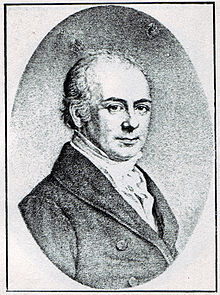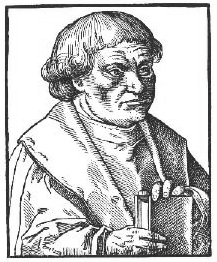Syndicus of the Hanseatic City of Lübeck
Syndicus of the Hanseatic City of Lübeck (also known historically as Stadtsyndicus or Ratssyndicus ) were the Syndici , who as legal scholars and later as lawyers advised the City Council and later the Senate of the Hanseatic City of Lübeck , carried out assignments and delegations for it and managed offices.

function
As a lawyer, the Lübeck Syndicus was the permanent legal advisor to the city and council. In contrast to the council secretaries in Lübeck, the Syndici had a seat and vote in the council. In terms of protocol, they stood between the mayors and the other councilors / senators. However, they were not allowed to vote in the council elections (council assembly). Like the other council members, they had judicial tasks in the Oberhof Lübeck as well as in the higher court until the introduction of the separation of powers and administrative tasks in the council's office and later in the senate.
history

The office of Syndicus has been handed down in Lübeck since the beginning of the 14th century. Originally, the Syndicus was the only legal scholar in the Senate. As early as 1486 there was a second Syndicus in Lübeck, from 1559 more or less permanent, in the 17th century and from 1844 until the Syndicate was abolished there were also three Syndici. Accordingly, the designation 1. Syndicus , 2. Syndicus and 3. Syndicus can be found in the sources. The office was initially awarded for a limited period. later, however, permanently and often the office ended, as with the mayors or councilors, only with the death of the owner or with his election as one of the mayors of Lübeck . With the introduction of the separation of powers in Lübeck, the Syndicat in Lübeck was abolished by the constitutional amendment of 1851 at the beginning of 1852, the last Syndici were formally senators of the city, but were still allowed to call themselves Syndicus .
The Syndici are not to be confused with the Lübeck council secretaries , who were also trained lawyers as town clerks and who, with Henricus de Brunsvic, have been responsible for running the council's office since 1242 . The first council secretary in Lübeck was called Protonotar based on the imperial and Vatican language usage and was already the oldest council secretary in 1361 with the status of notarius noster senior . From the office of the registrar of the chancellery, the position of the third (youngest) council secretary emerged from the 16th century, who from 1809 was also officially designated as the city archivist . He was also responsible for the bar in Lübeck's Marienkirche .
In the administrative tradition of the Hanseatic sister cities as city-states, the Hamburg Senate Syndicus or the Syndicus of the Free Hanseatic City of Bremen still lives in the administration of the State Council. In addition, the Hanseatic League partly had its own Syndici as the highest official and trustee in its later days, otherwise one of the Lübeck Syndici was also at the same time Syndicus of the Hansa.
See also
literature
- Friedrich Bruns : The Lübeck syndicists and council secretaries until the constitutional amendment of 1851 , in: ZVLGA Volume 29 (1938), pp. 91–168.
Web links
Individual evidence
- ^ Antjekathrin Graßmann (ed.): Lübeckische Geschichte . Schmidt-Römhild, Lübeck 1988, p. 616 ISBN 3-7950-3202-4